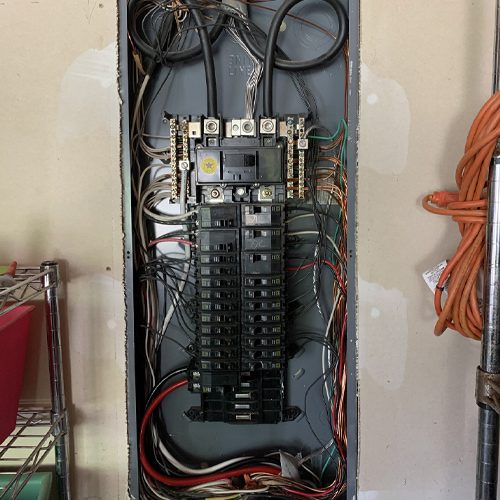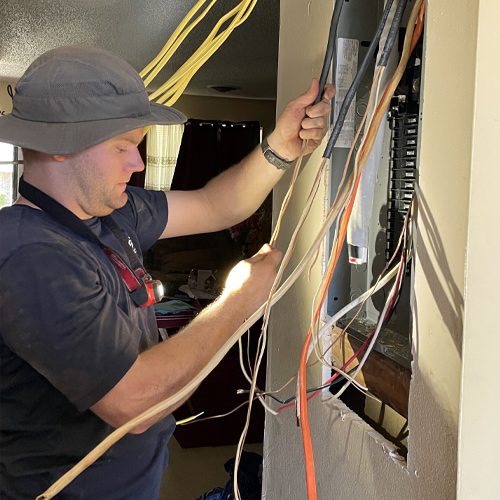Why does my circuit breaker keep tripping?
Calling all homeowners! Maybe you’re in your first home – maybe your second, third, or even fourth – nevertheless, there are many questions that make up the handbook of homeownership. One of the main questions that binds us all together (us being all homeowners who are not professional electricians!) is: “Why does my circuit breaker keep tripping?”
If you have ever found yourself in a situation where your circuit breaker keeps tripping and you just don’t know what to do, you are not alone. The flow of electricity is a complicated concept that usually leaves us dazzled and confused. Hopefully after this brief read, you will have a better idea about why your circuit breaker keeps tripping, electrical safety, and the potential electrical repairs your home or business may require.
How does a circuit breaker work?
Let’s start with the basics. What is a circuit breaker, and how does it work? We are so glad you asked! A circuit breaker is a device designed to open and close a circuit by non-automatic or manual means, and to open the circuit automatically when exposed to a predetermined overcurrent without causing damage to itself when properly installed and used within its rating.
If you are not an electrician, you may not have understood all of that, so let’s break it down. Basically, a circuit breaker is a piece of safety equipment designed to not only protect your electrical wiring, but also to prevent damage to your home or business when the current flowing through the electrical circuit has exceeded its own design limits.
When a circuit breaker trips, it has detected a fault within your wiring and stops the flow of electricity by physically disconnecting the circuit. This is important because if the electrical current within your wires exceeds their rated load they can dangerously overheat and even cause fires. Circuit breakers are life-saving devices, but can be annoying if they are routinely tripping.
What causes my circuit breaker to keep tripping?
A tripping circuit breaker can be caused by a variety of scenarios. Among the most common reasons include circuit overload, short circuit, ground fault, or a bad circuit breaker/panel.
If you are operating on a budget and feel inclined to get your hands dirty, there are some do-it-yourself (DIY) troubleshooting options you can attempt before calling a licensed electrician for resolution.
However, you should always contact an electrician immediately should you notice any sort of smoke or burning smell. Let’s break down some of these common reasons for a trippy circuit breaker, and examine what your options may look like!
Circuit Overload
Circuit overload occurs when the current flowing through the electrical circuit is too much for the circuit to handle. For example, if you are brewing your morning cup of coffee while your toast is crisping in the toaster and your circuit breaker trips, you likely have placed too much electrical demand on that particular circuit.
To avoid creating an overloaded circuit, try plugging your coffee brewer into a different outlet, then head out to the fuse box to manually reset the breaker. If this DIY hack is unsuccessful, try again after plugging your coffee brewer into another outlet. Repeat this process until you have tried each outlet within the immediate space. The goal is to find an outlet that is on a separate circuit – spreading the electrical load.
At this point, if you are still not able to brew your coffee or crisp your toast, you will need to call a licensed electrician. Upon arrival, an electrician can use a specialty probe to test the amperage (amps) of your circuit(s) in space. This tool will help them determine if additional outlets will need to be installed in order to support your gadgets.
Short Circuit
Let’s talk about short circuits. If you were to open up every single outlet in your home , you will notice that they are each equipped with three wires. One is a red or black colored wire referred to as the hot wire, one is a white-colored wire referred to as the neutral wire, and the third is a green or bare copper wire called the ground wire. In the rare event that the hot and neutral wires are crossed, meaning the hot wire touches the neutral wire, you’ve now created a short circuit within your electrical system.
Wires can cross due to a variety of reasons. A loose connection within the circuit, or old wiring in need of reconfiguration are two common reasons. In the event of a short circuit, your circuit breaker will continue to trip each time it is manually reset until the breaker is repaired.
A licensed electrician will always be needed to repair the breaker. Whether you are a homeowner or you are renting property, it is important to know that short circuits are the main cause of electrical fires within the home!
Ground Fault
Let’s take a look at your outlets. If you remove the electrical outlet cover to reveal the insides of the outlet box, you will notice a few small metal screws holding the outlet in place. Over time, these screws can wiggle around and become loose, causing the outlet to shift towards the metal drywall ring.
If an energized screw or other part of the outlet touches the outlet box, you have what is called a ground fault. A ground fault will always require a repair by a licensed electrician, as the breaker will continue to trip each time it is manually reset.
Bad Circuit Breaker or Panel
If there is visible damage to your electrical panel, you begin to smell a burning smell, notice your electrical panel overheating, experience a consistently tripped circuit breaker, or persistent flickering lights, it may be a sign you need to replace your circuit breaker. This is not a project you should attempt on your own!
Replacing a circuit breaker comes with the installation of all new cables and wiring, which will not only require a permit, but is also extremely hazardous for non-professionals. There is an electrical code that electricians must adhere to when installing or re-wiring anything in a home or business. Be sure to seek out a licensed electrician when replacing your circuit breaker or junction box.
Licensed Electricians
While there are several DIY tricks you can attempt to manage a sensitive breaker, it is always best to understand the risks involved and, whenever possible, defer to professional electricians. Attempting anything more than a minor project or breaker flip with your home’s electrical system puts your health, safety, and well-being on the line.
Electrical fire and shock are a couple possible outcomes if you do not take electrical safety seriously. Additionally, there are a variety of laws and permits to consider when it comes to modifying your home’s or business’s electrical system. Licensed electricians are educated on your area’s electrical code and will keep you out of harm’s way – both physically and legally.
Light switch!
Hopefully, this has given you a little insight on what options are available to you if you find your circuit breaker tripping, as well as what you should leave to professional licensed electricians. Our goal is for you to have a better understanding of what causes faulty circuit breakers and the intricacies of electrical safety and repairs. It is always best to take precautions when it comes to your home’s electrical system.
Some key takeaways: avoid overloading your electrical wiring by spreading electrical load across outlets, and if you encounter an outlet that just refuses to stop tripping or smell smoke, contact a professional electrician right away!


